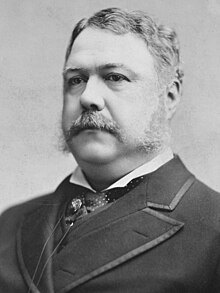 On July 2, 1881, President James Garfield was shot. He lingered on for an additional 80 days, after which he succumbed to his wounds.
On July 2, 1881, President James Garfield was shot. He lingered on for an additional 80 days, after which he succumbed to his wounds.But this post is not about Garfield. He’s being saved for later.
Instead it’s about his Vice President, Chester Arthur. Or, to be more exact, a letter Vice-President Arthur received. I first heard about this story in Candice Millard’s Destiny of the Republic: A Tale of Madness, Medicine and the Murder of a President (review forthcoming).
First some background. Although they were on a presidential ticket, Garfield and Arthur were not what we would consider a team. Quite the opposite. Garfield’s party at the time was fractured, and Arthur was put on the ticket at the convention to placate Garfield’s opponents.
Not that Arthur was much of a statesman anyway. He was a close friend and puppet of Roscoe Conkling, who was decidedly opposed to Garfield’s political reforms. Although having opposed Garfield, Arthur didn’t want the presidency himself. As the next in line for the office, there was also speculation at the time that Arthur was behind the shooting. He refused to act as president while Garfield was incapacitated, and rumor has it he was considering resigning.
But then he received a letter. It was written by a bedridden 31 year old woman named Julia Sand. He didn’t know her, but she encouraged him to overcome his hesitations and surprise everyone.
Your kindest opponents say ‘Arthur will try to do right’ – adding gloomily – ‘He won’t succeed though making a man President cannot change him.’ . . . But making a man President can change him! Great emergencies awaken generous traits which have lain dormant half a life. If there is a spark of true nobility in you, now is the occasion to let it shine. Faith in your better nature forces me to write to you – but not to beg you to resign. Do what is more difficult & brave. Reform! It is not proof of highest goodness never to have done wrong, but it is proof of it, sometimes in ones career, to pause & ponder, to recognize the evil, to recognize the evil, to turn resolutely against it…. Once in awhile there comes a crisis which renders miracles feasible. The great tidal wave of sorrow which has rolled over the country has swept you loose from your old moorings & set you on a mountaintop, alone.
* * *
You cannot slink back into obscurity, if you would. A hundred years hence, school boys will recite you name in the list of Presidents & tell of your administration. And what shall posterity say? It is for you to choose….
In all, Sand wrote 23 letters that we know about. Although he destroyed many of his more personal papers, President Arthur kept Sand’s, and they were eventually discovered after his death.
We don’t ultimately know how much of an effect Sand’s letters had on President Arthur. And do know that his actions as President coincided with her advice. Arthur severed all ties to Conkling and worked to reunify the Republican party. He refused to be anyone’s puppet, and instead became a strong advocate of continuing President Garfield’s civil service reforms. And we also know that in addition to keeping her letters, Arthur visited Sand at one point while he was President.
When Arthur left the White House, after having meticulously and beautifully renovated it, he was almost unrecognizable as the man who had been Garfield’s running mate and vice president. “No man ever entered the Presidency so profoundly and widely distrusted,” the well-known journalist Alexander mcClure wrote, “and no one ever retired . . . more generally respected.” It was not until after Arthur had moved back to New York City that it became widely known that he was suffering from Bright’s disease, an excruciatingly painful and, at that time, fatal kidney disease, He died two years later, at the age of fifty-six. (Millard, 251-52)
What I like most about this story is it shows not just once, but twice, what someone who by all accounts is insignificant is truly capable of. Julia Sand had nothing to indicate she could change the course of a nation. She simply wrote some letters. And Chester Arthur had been written off by the political establishment as a puppet and by the populace as a political hack. Yet he overcame all their disbelief and served the remainder of Garfield’s term as a respected and admired President.

This is a great story, Nicholas! Thanks for posting!
ReplyDelete